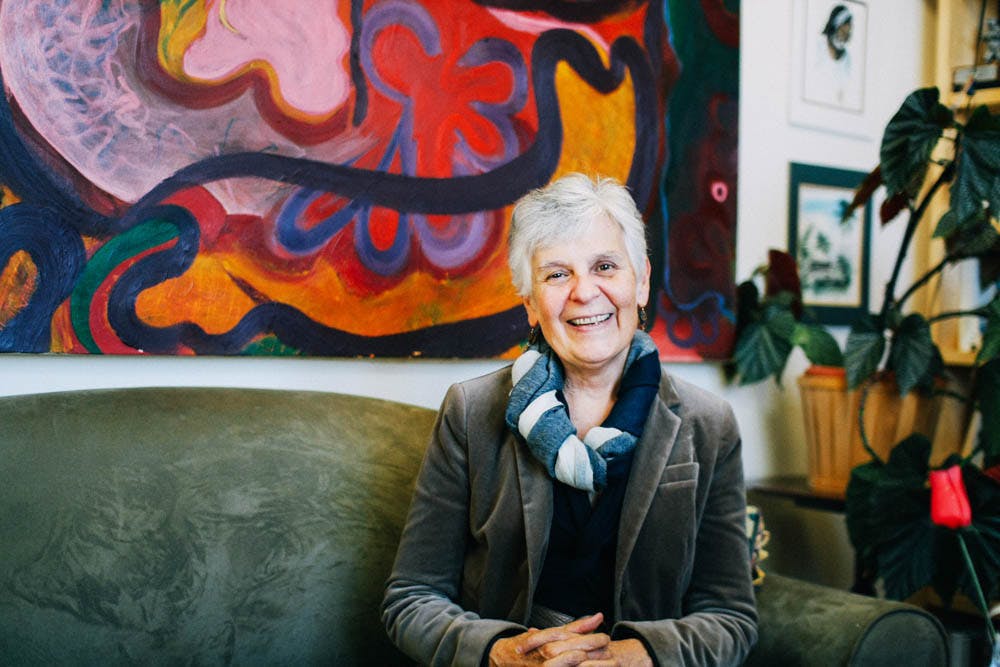Though The Herald’s spring 2017 undergraduate poll found that 69 percent of Brown undergraduates never participate in religious activities at Brown, religious life remains active for the 31 percent who do.
Interfaith dinners hosted by the Office of the Chaplains play a part in this. Tuesday night, several religious groups on campus got together for interfaith dinner on the fourth floor of J. Walter Wilson to discuss social justice, their religious lives and where they intersect. While this was only the second interfaith dinner of the semester, Rabbi Michelle Dardashti hopes it will lead to the “resurrection of an interfaith council.”
More than 20 students representing Judaism, Islam, Baha’i and different denominations of Christianity showed up to the event to share their ideas on social justice. The atmosphere was casual, and Meaghan O’Brien Crayne, Catholic campus minister, even brought her dog Artemis, who was running around and greeting students with a wagging tail.
After some eating and introductions, an “open space activity” began that Dardashti explained was a place for voicing questions and issues that would become discussions. Students were welcome to write a topic on a piece of paper that would act as a conversation starter. Topics included environmental justice, intersection of racial justice and faith-based activism and mental health and faith. Dardashti told students to “vote with your feet” and move in and out of groups based on interest, knowledge and experience with each topic.
Junaid Malik ’20, one of the directors of Building Relationships: Islam and Judaism, a program that brings together Muslim and Jewish fifth-graders from Rhode Island, was a part of the “Intersection of Racial Justice and Faith Based Activism” discussion. The group conversed about the racialization of faith and the role religion plays in encouraging the faithful to participate in racial justice.
Malik, who is Muslim, brought up the issue of the racialization of Islam. On campus, people explicitly “say things about Islam or Muslims that I find overly generalizes … the experience of Muslims,” Malik told The Herald.
Malik believes there “needs to be a great focus on creating areas and spaces where people are able to voice their questions.”
“If you have questions about Islam, there are Muslims here,” Malik said. “We want you to ask questions!”
The group reconvened as a whole to debrief their ideas, get contact information and make plans for initiatives in the future. Everyone in the group had to name a “one-on-one” they were going to have with a person of another faith. Besides further interfaith social justice dinners, Hillel has interfaith Shabbats and many religious events on campus welcome students of other religions or no religion.
When the dinner was over, O’Brien Crayne explained that all the chaplains get together for weekly interfaith staff meetings. “I mentioned at those meetings that we do a weekly Catholic social justice dinner. … Rabbi Michelle (said), ‘That sounds amazing, why don’t we do things together? Why don’t we talk about that together?’” O’Brien Crayne said. “So that was the initial birth of the collaboration.”
Janelle Wheeler ’18, the Catholic social justice coordinator, attended both interfaith dinners. Wheeler has been involved in her faith since before coming to Brown, saying that her mom is deeply involved in the “social justice aspect” of Catholicism. When talking about religion with people outside of faith groups, Wheeler said she assumes “secular, unless proven otherwise.”
If someone’s religion comes up in conversation, Wheeler said people tend to say, “You’re religious? That’s cool. I want to find out about it.”
And Brown has a vibrant religious life despite its secular stereotype, she said. “If you aren’t a part of those (religious or spiritual) communities, you don’t necessarily see that.” Wheeler said.
Michelle Miller ’18, a convert to Islam and a member of the Muslim Student Association, attended the first interfaith dinner. She told The Herald that she has faced misconceptions about her religion at home and on campus. Miller said she has received “weird looks” and has been asked, “Why would you choose that for yourself” in regards to her choice to convert. Miller has a particular interest in the relationship between faith and mental health and hopes people know Islam is “truly a religion of equality.”
These misconceptions may exist because of ignorance of her religion. Even on campus, MSA and Muslim life is relatively unknown. Though MSA is located in the basement of Morris and Champlin Hall, Miller said, “I would hope that people know about it, I would hope that they know it’s out there. It’s open to anyone that comes.”
Though Reverend Janet Cooper Nelson could not attend the dinner, she said she feels that religion can sometimes be an uncomfortable or uneducated discussion to have on campus. “The least educated conversation that’s happening at Brown is the conversation about religion,” Cooper Nelson said.
Ilana Brandes-Krug ’20, BRIJ co-director and a part of the 2017 Learning Chair for Brown-RISD Hillel, agreed.
“Overall, my impression is that the Brown campus is not comfortable talking about religion,” she wrote in an email to The Herald. “Tension surrounding discussions of religion even persist between different faith groups. The mission of BRIJ is to create dialogue about how our traditions inspire us to stand together and work for local change in our communities.”
Maria Ronchi ’19 and Jenna Tishler ’20, co-leaders of the Campus Unitarian Universalist Group, could not attend the interfaith dinner Tuesday, but both expressed a desire for more interfaith events. With a core group of six members, Ronchi and Tishler feel their group doesn’t always have the power to organize those events and can sometimes go unnoticed. On campus, Ronchi sometimes gets responses such as, “How is it even a religion?” or “Ew, spirituality, I wouldn’t go to that” when she talks about her religion, she said. Tishler agrees that there is a hesitance to UU, but not necessarily an animosity among Brown students.
Laughing a bit, Tischler said, “They like us because they use our church for graduation.”





